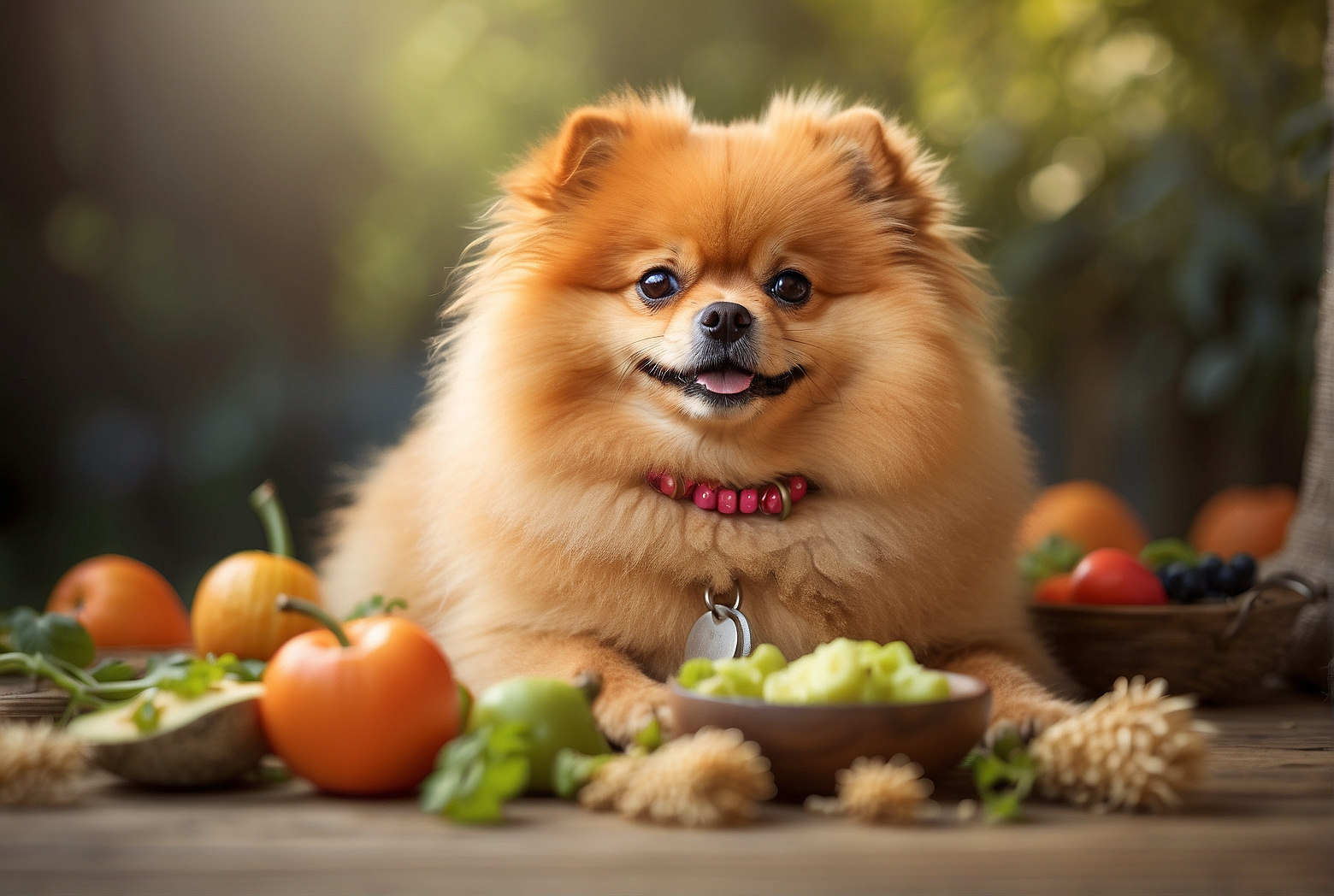Are you concerned about your overweight Pomeranian‘s health? If so, you’ve come to the right place! In this article, we will discuss the importance of a healthy diet for overweight Pomeranians. We understand that keeping your furry friend happy and healthy is a top priority, and a balanced diet plays a crucial role in achieving that. So, let’s explore some tips and recommendations for the best food options to help your Pomeranian shed those excess pounds and lead a more active and vibrant life!
Understanding Overweight Pomeranians
Pomeranians are a beloved breed of small dogs known for their fluffy coats and friendly nature. However, they are also prone to weight gain, which can lead to several health risks. Understanding the factors contributing to weight gain in Pomeranians and the associated health risks is essential in order to provide them with the proper care and support they need.
Factors contributing to weight gain in Pomeranians
There are several factors that can contribute to weight gain in Pomeranians. One common factor is overfeeding, where owners may unintentionally give their Pomeranians more food than they actually need. Pomeranians also have a slower metabolism compared to other breeds, which means that they require fewer calories to maintain a healthy weight. Lack of exercise and physical activity can also lead to weight gain in Pomeranians, as it prevents them from burning off excess calories. Understanding these factors can help owners take the necessary steps to prevent or address weight gain in their Pomeranians.
Health risks associated with obesity in Pomeranians
Obesity in Pomeranians can pose serious health risks and reduce their quality of life. Some of the common health problems associated with obesity in Pomeranians include joint and mobility issues, heart disease, diabetes, and respiratory problems. As Pomeranians are already a small breed, carrying excess weight can put additional strain on their joints and bones, leading to pain and difficulty in movement. Obesity can also lead to an increased risk of developing chronic health conditions, which can significantly impact a Pomeranian’s overall well-being. By understanding the health risks associated with obesity, owners can make informed decisions regarding their Pomeranian’s diet and exercise routine.
Consulting a Veterinarian
When dealing with weight issues in your Pomeranian, it is crucial to seek professional advice from a veterinarian. A veterinarian can provide expert guidance tailored to your Pomeranian’s specific needs and help develop a personalized weight loss plan.
Importance of seeking professional advice
While it may be tempting to rely on internet research or advice from other dog owners, every Pomeranian is unique and may require a different approach to weight loss. A veterinarian will not only have a thorough understanding of your Pomeranian’s health history, but they can also identify any underlying medical conditions that may contribute to weight gain. With their expertise, they can guide you on the most effective and safe ways to manage your Pomeranian’s weight.

Initial examination and health assessment
During your first visit to the veterinarian, they will conduct a comprehensive examination of your Pomeranian. This examination will involve assessing your Pomeranian’s overall health, body condition, and weight. The veterinarian may also inquire about your Pomeranian’s dietary habits, exercise routine, and lifestyle factors that may affect their weight. This initial assessment is essential in establishing a baseline for your Pomeranian’s health and determining the appropriate weight loss goals.
Discussion of weight loss goals
Once the initial examination is complete, the veterinarian will discuss weight loss goals with you. These goals will be based on your Pomeranian’s current weight, body condition, and overall health. It is important to have realistic expectations and set achievable targets to ensure a safe and sustainable weight loss journey for your Pomeranian. The veterinarian will guide you on the ideal weight range for your Pomeranian and help you understand the necessary steps to reach that goal.
Key Components of a Healthy Diet
A crucial step in helping your overweight Pomeranian shed those extra pounds is ensuring they have a balanced and nutritious diet. Here are some key components to consider when planning their meals.
Balanced and portion-controlled meals
A balanced diet is essential for your Pomeranian’s overall health and weight management. It should include the right balance of protein, carbohydrates, and fats. However, it is equally important to control the portion sizes to prevent overfeeding. Feeding the recommended amount of food based on your Pomeranian’s weight and activity level will help them maintain a healthy weight.
High-quality and low-calorie dog food options
When choosing a dog food for your overweight Pomeranian, opt for high-quality brands that offer low-calorie options. These foods are specifically formulated to provide the necessary nutrients while keeping the calorie content in check. Look for dog foods that are labeled as “weight management” or “light,” as these are typically designed to support weight loss in dogs.
Avoidance of table scraps and unhealthy treats
While it may be tempting to treat your Pomeranian with table scraps or unhealthy treats, these can quickly add calories to their diet. Instead, opt for healthier alternatives such as small portions of fruits or vegetables that are safe for dogs. Always remember to consult with your veterinarian before introducing any new foods into your Pomeranian’s diet.

Choosing the Right Dog Food
Selecting the right dog food for your Pomeranian plays a crucial role in their weight loss journey. Here are some factors to consider when choosing the right dog food.
Understanding nutritional labels
When evaluating different dog food options, it is essential to understand how to read and interpret nutritional labels. Look for dog foods that list a high-quality source of protein as the first ingredient, as protein is essential for weight loss and maintaining lean muscle mass. Avoid dog foods that contain excessive amounts of fillers, artificial additives, or high levels of carbohydrates.
Recommended macronutrient ratios for Pomeranians
Pomeranians require a specific balance of macronutrients to support their overall health and weight loss. Generally, a weight loss diet for Pomeranians should have a higher protein content (around 25-30%), moderate fat content (10-12%), and lower carbohydrate content.
Types of dog food suitable for weight loss
There are various types of dog food available, including dry, wet, and raw. When choosing dog food for weight loss, consider your Pomeranian’s preferences, dietary needs, and any specific requirements they may have. It may be helpful to consult with your veterinarian who can recommend the most suitable type of dog food for your Pomeranian’s weight loss journey.
Promoting Weight Loss with Exercise
In addition to a healthy diet, regular exercise is crucial for promoting weight loss in Pomeranians. Here are some key considerations for incorporating exercise into your Pomeranian’s routine.
Determining the appropriate exercise intensity
It is important to determine the appropriate exercise intensity for your overweight Pomeranian. Pomeranians have small frames and may be prone to joint issues, so it is important to start slowly and gradually increase the intensity as their fitness levels improve. Activities such as brisk walks, gentle runs, or interactive play sessions can be suitable options for helping your overweight Pomeranian burn calories and shed excess weight.
Suitable exercise options for Pomeranians
Pomeranians may not require as much exercise as larger breeds, but they still benefit from regular physical activity. Tailor the exercise routine to their fitness level and consider their age and any underlying health conditions. Swimming, agility exercises, short hikes, and playing fetch are all great ways to keep your Pomeranian active and promote weight loss.
Creating a consistent exercise routine
Consistency is key when it comes to exercise. Establishing a consistent exercise routine for your Pomeranian will not only help them burn calories but also provide mental stimulation and improve their overall well-being. Set aside dedicated time each day for exercise and stick to the routine to achieve the desired weight loss results.
Avoiding Common Pitfalls
When aiming to help your overweight Pomeranian lose weight, it is important to be aware and avoid common pitfalls that can hinder their progress. Here are some pitfalls to watch out for.
Overfeeding and free-feeding
One of the most common mistakes made by owners is overfeeding or free-feeding their Pomeranians. This practice involves leaving food out all day, allowing the Pomeranian to graze whenever they please. Instead, establish a feeding schedule and strictly follow the recommended portion sizes to prevent overfeeding and unnecessary weight gain.
Begging and feeding from the table
Another pitfall to avoid is feeding your Pomeranian from the table or giving in to their begging behaviors. Food scraps or treats from the table can quickly add up in calories and disrupt your Pomeranian’s weight loss progress. It is important to establish boundaries and only feed them the appropriate meals and treats as part of their weight loss plan.
Inconsistent exercise practices
Consistency plays a vital role in your Pomeranian’s weight loss journey. Inconsistent exercise practices can hinder progress and make it challenging for your Pomeranian to shed those extra pounds. Make a commitment to regular exercise and follow through with daily physical activity to ensure consistent progress.
Implementing Healthy Feeding Habits
Implementing healthy feeding habits is crucial for managing your Pomeranian’s weight effectively. Here are some tips to promote healthy feeding habits.
Establishing a feeding schedule
Establishing a consistent feeding schedule for your Pomeranian is essential. Determine the number of meals per day that align with their weight loss goals and divide their daily recommended food portions accordingly. By following a feeding schedule, you can monitor their food intake and prevent overfeeding.
Measuring portions accurately
Measuring your Pomeranian’s food portions accurately is crucial to avoid overfeeding. Use a designated measuring cup or scale to ensure you are providing the recommended amount of food based on their weight and activity level. Avoid estimating portion sizes, as this can often lead to unintentional overfeeding.
Avoiding unnecessary extra calories
Be mindful of additional calories that may unknowingly make their way into your Pomeranian’s diet. For example, dog treats can add up in calories, so choose low-calorie options that are suitable for weight loss. Avoid adding extra toppings or condiments to their meals that may increase calorie intake unnecessarily. By being mindful of these extra calories, you can better manage your Pomeranian’s weight loss progress.
Safely Transitioning to a New Diet
If you are planning to switch your Pomeranian’s diet to a new weight loss food, it is important to do so gradually and ensure their transition is smooth and safe.
Gradual introduction of new food
When switching to a new diet, it is recommended to introduce the new food gradually. Start by mixing a small portion of the new food with their current food and gradually increase the ratio over a week or two. This gradual transition helps your Pomeranian adjust to the new food and reduces the likelihood of any digestive issues.
Monitoring for any adverse reactions
During the transition period, monitor your Pomeranian for any adverse reactions or digestive issues. While digestive issues may be relatively common during a diet change, it is important to seek guidance from a veterinarian if these issues persist or worsen. They can provide further guidance and recommend any necessary adjustments to the diet.
Seeking guidance if dietary changes result in digestive issues
If your Pomeranian experiences persistent digestive issues or any adverse reactions after transitioning to a new diet, it is essential to seek guidance from a veterinarian. They can assess the situation, recommend suitable alternatives, and ensure that any underlying health concerns are addressed.
Monitoring the Progress
Regular monitoring and assessment of your Pomeranian’s progress are crucial to ensure their weight loss journey is on track. Here are some key areas to focus on when monitoring their progress.
Regular weigh-ins and body condition assessments
Schedule regular weigh-ins with your veterinarian to track your Pomeranian’s weight loss progress. This will help you determine whether they are moving toward their weight loss goals at a healthy and safe pace. In addition to weigh-ins, perform routine body condition assessments at home to visually monitor changes in their overall body shape and condition.
Tracking changes in energy levels and behavior
Pay attention to any changes in your Pomeranian’s energy levels and behavior as they progress in their weight loss journey. Typically, as they shed excess weight, their energy levels may increase, and they may display a more active and playful demeanor. Monitoring these changes can help you gauge the effectiveness of the weight loss plan and make any necessary adjustments.
Adjusting the diet and exercise plan accordingly
As your Pomeranian progresses in their weight loss journey, it may be necessary to adjust their diet and exercise plan. If weight loss plateaus or if their energy levels decrease significantly, consult with your veterinarian to evaluate the need for any modifications. They can guide you on adjusting portion sizes, increasing exercise intensity, or considering other suitable options to continue the weight loss progress.
Additional Tips for a Healthy Lifestyle
In addition to managing your Pomeranian’s weight, there are other factors that contribute to their overall health and well-being. Here are some additional tips for maintaining a healthy lifestyle for your Pomeranian.
Ensuring fresh water is always available
Make sure your Pomeranian has access to fresh and clean water at all times. Hydration is essential for their overall health, digestion, and metabolism. Keep their water bowl filled regularly and clean it daily to promote good hygiene.
Reducing stress and anxiety levels
Stress and anxiety can negatively impact your Pomeranian’s overall health and well-being. Provide a calm and safe environment, engage in positive reinforcement training, and offer mental stimulation to help reduce their stress levels. Regular interaction and playtime are also important for their emotional well-being.
Maintaining regular veterinary check-ups
Regular veterinary check-ups are essential for maintaining your Pomeranian’s overall health. Schedule annual or bi-annual visits to monitor their weight, address any health concerns promptly, and receive guidance from a professional to ensure their well-being. Regular check-ups can also help prevent weight gain and detect any underlying health conditions early on.
By understanding the factors contributing to weight gain in Pomeranians, implementing a balanced and portion-controlled diet, providing regular exercise, and seeking guidance from a veterinarian, you can help your overweight Pomeranian achieve a healthier weight and improve their overall well-being. With patience, commitment, and love, you can support your Pomeranian on their weight loss journey and ensure they live a long and happy life.
